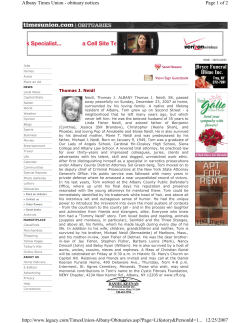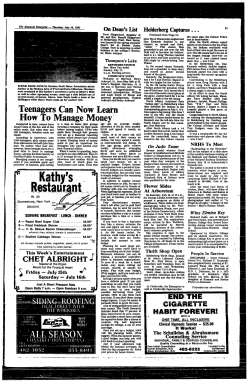
Researching New York: Perspectives on Empire State History
Researching New York: Perspectives on Empire State History November 20 & 21 2014 ~ University at Albany-SUNY THURSDAY NOVEMBER 20, 2014 11:30 AM – 5:30 PM: REGISTRATION & EXHIBITS University at Albany, Science Library, Barnes and Noble Reading Room SESSION I: 12:15 -1:45 PM Opposing Loyalties: Forging Political Identities Becoming ‘Loyalist’: Partisanship and the Origins of Loyalism in New York City Christopher F. Minty, New York Historical Society “That Wretched Question about the State Right of New York to Hang McLeod”: The McLeod Case and Governor William H. Seward’s Political Identity Christopher Leahy, Keuka College Comment: Eric Morser, Skidmore College ___________________________________________________ Work, Leisure and Culture: Community Identities Palenville: From the Fumes of Tanning to the Peaks of Cole Ron Dombrowski, Mountain Top Historical Society, Greene County Historical Society Automobile and Truck Manufacturers of Syracuse and Onondaga County, New York 1884-2010 Walter Miller, The Museum of Automobile History New York City, Second Generation Artists, and New Identities in the 1950s Joan Fiori Blanchfield, University at Albany, SUNY Comment: Mary Borden, Empire State College ___________________________________________________ 1 Identities Accepted, Identities Rejected Black or Deaf? African-American Students at the New York School for the Deaf Rebecca A.R. Edwards, Rochester Institute of Technology Not in My Backyard: Community Opposition to Group homes in New York State Kathryn Lawton, University at Buffalo, SUNY Reform & Identity in Rural New York Schools Casey Jakubowski, University at Albany, SUNY Comment: Margaret Lynch Brennan, Independent Scholar, NYS, Dept. of Education, retired SESSION II: 2-3:30 pm The Complex Identity of Roosevelt Island A Roundtable Discussion Roosevelt Island: New York City’s Therapeutic Logistics Locale Sean McGee, Cornell University Protect This House: Residential Design anthe Evolution of Community on Roosevelt Island Roberta Moudry, Cornell University The “Fruits” of Health Reform: Three Leading Figures Who Shaped the Identity of New York City’s Roosevelt Island Judith Berdy, Roosevelt Island Historical Society Autopsy of a Hospital: Photographic Record of Coler-Goldwater on Roosevelt Island Charles Giraudet, Charles Giraudet Photography Moderator: Roberta Moudry, Cornell University Discarded Identities in the Age of Urban Renewal, 1930-1970 From Baghdad to Gotham: Identity Fetishism and Cannabis Sativa in New York City, 1925-1937 Bob Beach, University at Albany, SUNY People of Waste and People of Plenty: The Young Lords Garbage Offensive and Puerto Rican Identity Tina Peabody, University at Albany, SUNY The people of the South End: The Engineering of Albany’s Capital Shannon Missick-Wood, University at Albany, SUNY Comment: Paul Murray, Siena College 2 Making History Work: Interdisciplinary Approaches to Public History A Roundtable Discussion John Bonafide, Technical Preservation Services Bureau, NYS Division of Historic Preservation Kathleen Johnson, HistoryConsulting.com Michael T. Lucas, New York State Museum John Scherer, NYS Museum, Emeritus; Town of Clifton Park Historian Ivan Steen, Center for Applied Historical Research, University at Albany , SUNY 3::30 PM Break & History Showcase Join us in the Exhibit Area, Barnes & Noble Reading Room SESSION III – 4:15-5:30 pm Hodinohso:ni’ in Post-World War II New York: New Perspectives. How Ernest Benedict Saw the World: A Mohawk Journalist and the International Indigenous Rights Movement Kwinn Doran, University at Albany, SUNY Contemporary Events in Iroquois Territory Doug George-Kanentiio COMMENT: Laurence M. Hauptman, SUNY New Paltz Emeritus, Heriberto Dixon, SUNY New Paltz Emeritus CHAIR: Kevin White, SUNY Oswego From the Archives: Writing History/Writing Biography A Conversation with Richard Norton Smith Off-Site Events: Transportation will be provided for those who sign up when registering 6:00 PM ~ RECEPTION~Historic Milne 200 7:30 PM Thursday November 20th Page Hall University at Albany, Downtown Campus On His Own Terms: A Life of Nelson Rockefeller Richard Norton Smith Fourteen years in the making, On His Own Terms is the first complete biography of Nelson Rockefeller. Drawing on thousands of newly available documents, some two hundred interviews, and Rockefeller’s unpublished reminiscences, Richard Norton Smith recreates this complex life, both personal and political; A political and presidential historian, a public intellectual regularly appearing on C-Span and other public affairs programs, Richard Norton Smith is the former head of 6 presidential libraries. An earlier work, Thomas E. Dewey and His Times, was a finalist for the 1983 Pulitzer Prize. Sponsored by the New York State Writers Institute and the University at Albany History Department, this featured conference event is free and open to the public, made possible with the support of the NYS Council for the Humanites. The shuttle bus will return to the University at Albany Science Library immediately following the talk. 3 FRIDAY, November 21, 2014 8:15 AM – 3:30 PM: REGISTRATION & EXHIBITS University at Albany, Science Library, Barnes and Noble Reading Room Coffee and Continental Breakfast SESSION V: 9-10:15 AM Political Communities: Not Always Business as Usual Vanquished Warrior: Reconsidering Al Smith’s 1928 New York Defeat Robert Chiles, University of Maryland Redressing the Imbalance: Incorporating Women Legislators into New York’s Political History Lauren Kozakiewicz, University at Albany, SUNY Comment: Tod Ottman, Independent Scholar How an Amusement Park Closure and Hockey Logo Change Threatened a Region’s Character Forever Reaching for the Ring: Losing a Long Island Amusement Park Marisa L. Berman, Kupferberg Holocaust Resource Center and Archives Fisherman Flop: The Infamous Hockey Logo That Riled Long Island Nicholas Hirshon, Ohio University Comment: Suzanne Wasserman, Gotham Center for New York City History/CUNY Eleanor Roosevelt: A Working Woman Multiple Identities: The Careers of Eleanor Roosevelt Frank Futral, Roosevelt Vanderbilt National Historic Site Eleanor Roosevelt’s Community Stimulus Program Franceska Macsali Urbin, Roosevelt Vanderbilt National Historic Site Eleanor Roosevelt and the Fight for Social Justice Shannon Butler, University at Albany, SUNY Comment: Frank Futral, Roosevelt Vanderbilt National Historic Site SESSION VI – 10:30 -Noon Crime, Scandal, and Identity “Did All These Children Die a Natural Death?” Infanticide, Infant Abandonment and Infant Mortality in Antebellum New York City Dutch’s Spirits and The American Dream Sherri Darocha, Dutch’s Spirits at Harvest Homestead Farm Selling Sex in the Queen City: Prostitution in Elmira, 1860-1920 Kelli Huggins, Chemung County Historical Society 4 Marcela Micucci, Binghamton University Comment: Richard F. Hamm, University at Albany, SUNY A Roundtable Discussion: “Is New York a Liberal City?” The Limits Of Liberalism: AIDS Activists and Reproductive Rights Feminists in New York City Tamar Carroll, Rochester Institute of Technology Liberalism in the Jim Crow North: Black People in 20th Century New York City Brian Purnell, Bowdoin College Crime & Liberalism in Postwar New York City Robert W. Snyder, Rutgers University-Newark The Liberal Party & the Decline of Independent Labor Politics in New York Daniel Soyer, Fordham University Public Housing Residents vs. Urban Liberalism 1960-1995 Fritz Umbach, John Jay College of Criminal Justice, CUNY Beyond Seneca Falls: Integrating Women into New York History A Roundtable Discussion Susan Lewis, SUNY New Paltz Laura Dull, SUNY New Paltz Susan Goodier, Hamilton College, SUNY Institute of Technology Karen Pastorello Tomkins Cortland Community College The Making of a Myth: Seneca Falls Unraveled Lisa Tetrault, Carnegie Mellon University Lunch Keynote Friday November, 21st The story of how women’s rights began in 1848, at the women’s rights meeting in Seneca Falls, New York, is a cherished American myth. But where did that story come from? Who invented it? And for what reasons? Unraveling that story by investigating its roots, which lay fifty years after the convention, Tetrault invites us to rethink the relationship of Seneca Falls to the evolution of modern women’s rights activism. Carnegie Mellon University historian Lisa Tetrault is the author of The Myth of Seneca Falls: Memory and the Women’s Suffrage Movement, 1848-1898. She specializes in U.S. women’s history, memory, and social movements. SESSION VII: 2:00-3:30 PM Reproduction: Imagined and Reimagined Stirpiculture: Science Guided Human Propagation and the Oneida Community Alexandra Prince, Rensselaer County Historical Society A Pragmatic Approach to an Indiscreet Topic: Margaret Sanger and the Early Years of the “Birth Control Review” Sarah Patterson, University at Albany, SUNY 5 Conceiving an Identity on Film: Margaret Sanger’s Self-Representation in “Birth Control” (1917) Martin F. Norden, University of Massachusetts Comment: Nancy Rosenbloom, Canisius College Shaker Identities Perceptions of Ann Lee Starlyn D’Angelo, Shaker Heritage Society -- The Shakers as Social Service Providers Samantha Hall-Saladino, Shaker Heritage Society Who were the Wicks? Ann Sayers, Shaker Heritage Society Comment/Moderator: Lisa Seymour, New York State Museum Circling the Civil War: Old Sources, New Lens African American Albany: A View from the Census, 1855-1875 Francis Butler, Siena College The Paper Heart of a Bureaucratic Underdog: Orsell Cook Brown, an Unacknowledged Assistant in an Acknowledged Regiment Cassandra Jane Werking, University at Albany, SUNY 1886 Banquet Book: A Research Clue on Transformation of NY Blacks’ Identity Thomas C. McCarthy, NY Correction History Society Comment: Jennifer Lemak, New York State Museum Public History: Variations on a Theme Uncovering New York’s Maritime History: Inspiring Students’ Creative Approaches to Researching Maritime Artifacts David Allen, SUNY Maritime College Promoting Identities of New York: New York Heritage and the Digital Public Library of America Lawrence Naukam, Rochester Public Library, retired. Putting New York State History to Work: The Spirit of New York Bruce W. Dearstyne, Independent Scholar Comment: Devin Lander, Museum Association of New York The Workers of the Erie Canal: They Built America 4:00 PM Friday November 21st Recital Hall Performing Arts Center Uptown Campus Written by Maggie Mancinelli-Cahill, Artistic Director of the Capital Repertory Theatre, this innovative drama examines the origins of the Erie Canal, a miraculous waterway that transformed America from a burgeoning country into a great nation. Sourced from more than 35 historical records—and created to bring professional theatre and history to school 6 audiences—They Built America features the politicians, farmers, merchants, and laborers who came north to build the Canal. This live performance, featuring professional actors from Cap Rep, is free and open to the public. Co-sponsored by the University at Albany Public History Program, this event is free and open to the public. Researching New York is sponsored by the University at Albany Department of History and History Graduate Student Organization and the New York State Archives Partnership Trust. Cosponsored by the M.E. Grenander Department of Special Collections & Archives, University Libraries and the Judaic Studies Program, with additional support from The New York State Historical Association and the Farmer’s Museum, and the University at Albany College of Arts & Sciences, the Office for Research, and University Auxiliary Services. For program updates, registration information, and additional details, go to www.nystatehistory.org Updated October 25 , 2014 7
© Copyright 2025












